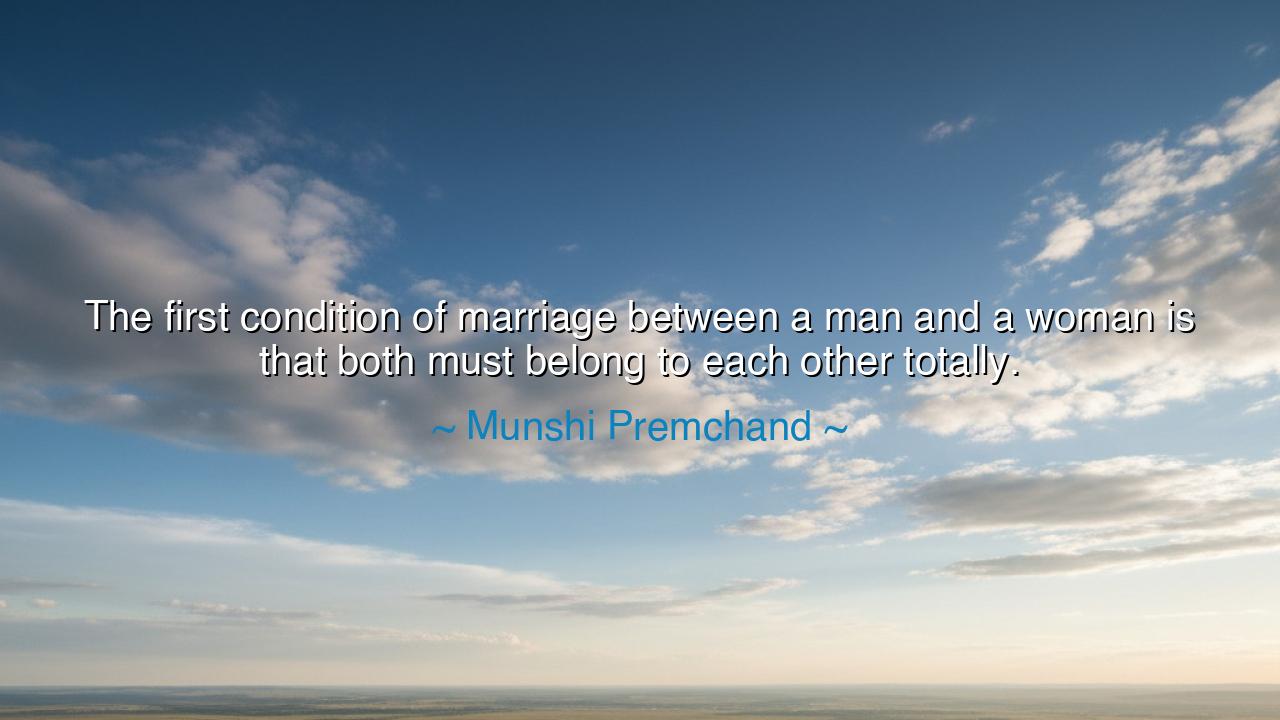
The first condition of marriage between a man and a woman is that
The first condition of marriage between a man and a woman is that both must belong to each other totally.






In the profound and timeless words of Munshi Premchand, the sage of Indian literature and the voice of the common heart, we find a truth as eternal as love itself: “The first condition of marriage between a man and a woman is that both must belong to each other totally.” In these few simple words lies the essence of all sacred union—the idea that marriage is not a contract of convenience, nor a meeting of circumstance, but the complete surrender of two souls into one shared existence. To “belong to each other totally” is not to lose oneself in the other, but to offer oneself wholly, without fear, without deceit, without the walls that pride and ego so often build around the heart.
The origin of this quote is deeply rooted in Premchand’s lifelong meditation on the nature of human relationships and morality. Living in early twentieth-century India—a time of social reform, awakening, and cultural transformation—Premchand sought to reveal the hidden truths of the human condition. His stories were not about kings or conquerors, but about ordinary men and women whose lives were shaped by love, duty, and sacrifice. In his eyes, marriage was not a mere social institution—it was a moral and spiritual alliance, a testing ground for sincerity and devotion. When he spoke of “belonging totally,” he was defining not possession, but commitment—the deep recognition that love cannot flourish where the self remains divided.
In the ancient philosophies of the East and West alike, this truth resounds. The Sanskrit scriptures speak of the “ardhangini”, the belief that a wife is half of her husband’s being, and that only together are they whole. The Greek poet Plato, in his Symposium, told of the mythical union of two halves of one soul, forever seeking reunion. Across time and culture, the wisdom remains the same: love demands wholeness. To love partially is to love in fear; to give oneself completely is to become something greater than oneself. When Premchand declared that both must belong “totally,” he was not speaking of dominance or submission, but of the sacred equality that comes from mutual devotion—each belonging to the other as the earth belongs to the sky, each completing the other’s silence and song.
Consider, for a moment, the story of Savitri and Satyavan from the ancient Indian epics. When Savitri learned that her husband was destined to die within a year, she did not turn away; instead, she stood firm in her love, following him even into the realm of death. Her faith, her total belonging, moved the god of death himself to restore her husband’s life. Their tale has lived for millennia, not because it is a myth, but because it captures the essence of what Premchand later echoed—the idea that love that holds nothing back can defy even mortality. In belonging completely, Savitri became not the shadow of her husband, but his equal in strength and virtue.
And yet, the path to such belonging is not easy. To belong “totally” means to strip away pride, to silence the restless voice of self-interest, to look upon the other not as possession but as reflection. Modern hearts often fear such surrender, mistaking it for weakness. But Premchand, ever the moral realist, understood that true belonging demands courage. It asks us to trust even when trust is hard, to forgive even when wounded, to see in our partner not a rival but a mirror of our own soul’s journey. For in the sacred union of two beings, every joy and every sorrow must be shared—each pain halved, each happiness doubled.
Marriage, as Premchand saw it, is the crucible of the human spirit. It is not made by rituals or ceremonies, but by the daily acts of faith between two people. When a man and woman give themselves to each other completely, they become guardians of one another’s hearts. Their love becomes an act of worship, their loyalty a kind of prayer. To “belong totally” is not to be consumed, but to be illuminated—to find in another’s love the divine spark that lies within all things. It is the most sacred of human endeavors, where two imperfect beings strive toward perfect unity through compassion and truth.
The lesson for us, then, is clear and eternal: love cannot live in halves. Whether in marriage or any bond of the heart, sincerity demands total presence. If you give love, give it without hesitation. If you receive it, cherish it without fear. To “belong totally” means to walk through life hand in hand, not as owner and owned, but as equals—each carrying the other through darkness, each celebrating the other’s light. In an age where love often fades amid distraction and pride, Premchand’s wisdom stands as a lamp for all generations: that to love truly is to belong wholly, body and soul, until the very end.
So let this truth be spoken as the ancients would speak it: Love that divides itself will die; love that gives itself entirely will endure beyond time. For in the joining of two hearts in full devotion lies not only the secret of marriage, but the secret of all creation—that through surrender, we find strength; through belonging, we find freedom; and through love, we find eternity.






AAdministratorAdministrator
Welcome, honored guests. Please leave a comment, we will respond soon